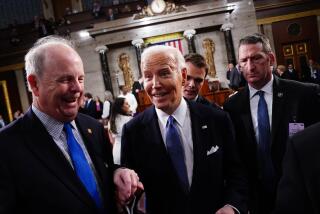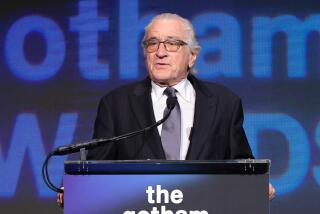150 years later, newspaper prints a Gettysburg redress
- Share via
NEW YORK — Four score and 70 years ago, a Pennsylvania newspaper chided Abraham Lincoln’s Gettysburg Address as “silly remarks.”
This week, in time for the speech’s 150th anniversary, Harrisburg’s Patriot-News apologized for “a judgment so flawed, so tainted by hubris, so lacking in the perspective history would bring, that it cannot remain unaddressed in our archives.”
With that, the newspaper’s editorial board issued an unusual media mea culpa that has captured national attention despite its tongue-in-cheek approach.
It read in part: “Our predecessors, perhaps under the influence of partisanship, or of strong drink, as was common in the profession at the time, called President Lincoln’s words ‘silly remarks,’ deserving ‘a veil of oblivion,’ apparently believing it an indifferent and altogether ordinary message, unremarkable in eloquence and uninspiring in its brevity.”
“Just think: The speech, the exact words of it, are still looked at, thought about and dissected,” said Michele Hamill, a conservator at Cornell University in Ithaca, N.Y., where one of five copies of Lincoln’s handwritten speech is on display through Nov. 23 in commemoration of its delivery Nov. 19, 1863.
“He was a very thoughtful writer, and it shows,” Hamill said, referring both to the penmanship and the substance of the speech, which was short — about two minutes — but memorable.
So too was the dissing it received in some media, a scoff that haunted the Harrisburg editors until their editorial, which ran Thursday with a column explaining the decision to declare: “The Patriot-News regrets the error.”
Donald Gilliland, the reporter who wrote the explanatory article, noted that the dismissive comments about Lincoln’s address did not appear until five days after he had delivered them. Days earlier, the paper — then called the Patriot & Union — had devoted extensive coverage to the president’s visit to the Pennsylvania city, including printing the full text of his speech without editorial comment, Gilliland noted.
Gilliland also said the critical editorial was not aimed only at Lincoln’s words, but also at what editors considered the political theater of the Gettysburg event, which was held to dedicate a cemetery to Union soldiers killed during the battle there four months earlier.
Whatever the context, Gilliland wrote that the words that appeared on Nov. 24, 1863, earned the newspaper “an enduring place in history for having got Lincoln’s Gettysburg Address utterly, jaw-droppingly wrong.”
This isn’t the first time a newspaper has apologized many years after the fact. In 2004, the Lexington Herald-Leader in Kentucky apologized for its failures in covering the civil rights movement in the 1960s. The Meridian Star in Mississippi issued an apology to coincide with President Obama’s 2009 inauguration, saying in an editorial that it, and many papers across the South, had “acted with gross neglect” in not covering pivotal civil rights events.
“We did it through omission, by not recording for our readers many of the most important civil rights activities that happened in our midst, including protests and sit-ins. That was wrong,” the Meridian Star said.
The Patriot-News apology lacks the somber tone of those apologies, but it is no less significant, said Todd Gitlin, a professor of sociology and journalism at Columbia University.
“An apology is sort of a port of entry to a recognition of what’s at stake and what our values are,” Gitlin said.
He said Lincoln’s message — that the nation was in a fight for democracy — is as true today as it was then, citing the current battles over issues such as voter ID laws, which civil rights activists say are designed to limit minority voting.
“The reason why I think it makes sense … to take note of the retrograde position the paper held is because this principle is still being fought over,” Gitlin said.
Five copies of the speech exist: two in the Library of Congress, one in the White House, one at the Illinois State Historical Library and one at Cornell. All are written in Lincoln’s neat penmanship, but they contain slight differences.
The copy at Cornell, for example, reads “on this continent” instead of “upon this continent” in the famous first line.
That sets it apart from the two in the Library of Congress, which were written before Lincoln delivered the address, a time lag that probably explains the different wording.
Lincoln wrote the Cornell copy a few days after the speech at the request of George Bancroft, a historian who wanted to make reproductions of the document to raise money for wounded soldiers.
Hamill said Lincoln used high-quality linen-based paper and iron gall ink derived from gall nuts. He sent it to Bancroft, but the effort fell flat. That’s because Lincoln had written on both sides of a piece of paper, and technology did not allow the reproduction of double-sided documents. Bancroft asked for another copy.
“Imagine, this is a time of war and you’re asking Lincoln again to do this thing,” Hamill said.
The president sent Bancroft a fresh copy, using two pieces of paper. Bancroft was left with what at the time seemed to be a “piece of useless paper,” Hamill said, but he held onto it and willed it to his grandson, a chemistry professor at Cornell.
During the Depression, the document was sold to a New York City dealer, but it eventually ended up back in Cornell’s hands, where it is guarded by a university police officer while it is on display.
Hamill marveled at the idea that a president with a war to run had taken the time to write out his speech five times. And in perfect penmanship.
The Patriot-Union said that with the anniversary of the speech, “the time was ripe” to clear the air.
“Really, this isn’t a question of journalism ethics, as would be the case with a serious retraction,” the paper’s deputy opinion editor, Matthew Zencey, wrote to iMediaEthics.org, which monitors media errors, apologies and retractions.
“It was more a way of using the 150th anniversary to say, with a wink, ‘Gee, can you believe what rock heads ran this outfit 150 years ago?’ ”
More to Read
Sign up for Essential California
The most important California stories and recommendations in your inbox every morning.
You may occasionally receive promotional content from the Los Angeles Times.











